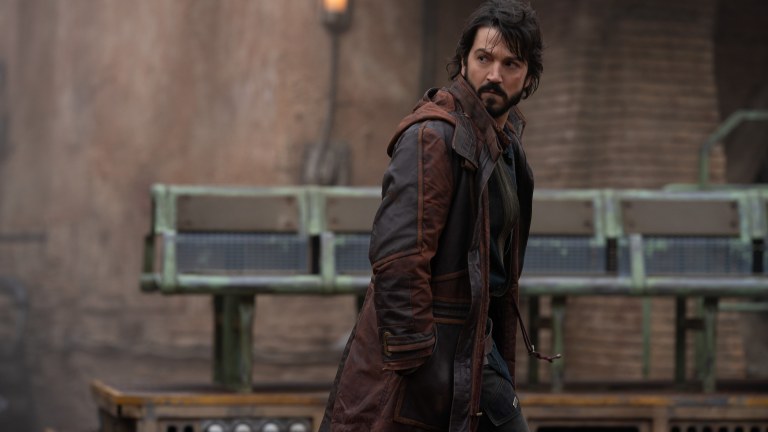Star Wars Andor Revives What’s Been Missing from the Saga
Exclusive: Diego Luna dishes about why Andor is a Star Wars project with something important to say.

From the moment he steps onto the screen, you know this rebel is not like the others. Cassian Andor can be cold and ruthless, has a certain air of danger about him, and isn’t afraid to get his hands dirty—even if it means killing an informant in a tight spot. When we first meet him in 2016’s Rogue One: A Star Wars Story, Cassian is a far cry from the altruistic rebel heroes featured in the morally black-and-white movies George Lucas made in the late ’70s and early ’80s. As we spend more time with Cassian, we learn he’s the agent the Rebel Alliance sends in when it’s time to go off the books.
But how did this lifelong freedom fighter become the Rebellion’s foremost assassin? That’s the question at the center of Andor, a new live-action series coming to Disney+ in August. The spy thriller follows Cassian five years before the events of Rogue One and reunites actor Diego Luna with writer-director Tony Gilroy, who oversaw extensive reshoots for the 2016 movie directed by Gareth Edwards.
When Luna sits down to chat with Den of Geek over Zoom, there’s clear enthusiasm, but also relief, in his voice. Andor is finally seeing the light of day, but the 42-year-old actor is quick to point out how tough the shoot was—cameras started rolling in the UK in Nov. 2020 in the early days of the Covid-19 pandemic. The show was originally supposed to film earlier that year, but production delays across virtually every studio on the planet meant that Luna was left to wonder if he’d ever actually get a second chance to play Cassian: “I went through so many stages, different ones of thinking this wasn’t happening, there was no need for something like this. Then I went, ‘Oh, we have to do this. The whole team needs to know that they’re capable of pulling this off.’”
Luna, who hails from Mexico, grew up a Star Wars fan, like most other kids born in the late ’70s. The saga, which in Spanish is called La guerra de las galaxias, has always been a big part of his life. Yet, as an actor, Luna’s stellar career has largely been defined not by Star Wars-sized blockbusters but by Oscar-nominated dramas, such as Alfonso and Carlos Cuarón’s coming-of-age road trip movie Y tu mamá también, in which he starred opposite Maribel Verdú and childhood friend Gael García Bernal. That film, which is set in 1999 against the backdrop of a major political shift in Mexico where the ruling party was ousted after 71 years in power, was an international hit and broke box office records in Luna’s home country. It also launched the movie career of the actor, who, at the time, was best known from telenovelas. On top of many other Spanish-language productions, he’s also worked with Steven Spielberg (The Terminal), Gus Van Sant (Milk), and Barry Jenkins (If Beale Street Could Talk).
One can guess the reason why Luna has had such a fruitful acting career: he is very passionate about his roles. As he recounts what it was like suiting up as a younger version of his Star Wars character four years after the release of Rogue One, you get the sense that there’s quite a bit of Cassian in the actor, who is loyal to the cause and driven to get the job done, no matter the odds, until the very end.
“It was quite an experience,” Luna says of wrapping the show’s first season. “I don’t think anything in my life has been like that. And I’m sure nothing will be like that ever again. It was such a mix of emotions.”
But to some viewers, a show about Cassian might seem like an odd choice. Didn’t we watch him die, obliterated by the Death Star, in Rogue One? What’s the point of exploring this character’s past when we already know how it all ends? But since 1977, Star Wars has often worked backward, showing us the ends of things before taking us all the way back to the start of the story. Andor continues that tradition.
“For me, Rogue One is the beginning of something,” Luna says. “I’m so happy to be able to dig in deeper.” In fact, the actor views “going backward” with the tale of Cassian Andor as
an exciting challenge.
“We know where this character ends, but how complicated can we make it for him to get there?
And that’s where creativity comes in because it’s never the way you approach a story. It’s like a different part of your brain that has to connect,” Luna says. “It’s exciting to have that opportunity in storytelling of going backward and not forward. Going forward is easy. As an actor, this is what you’re always asked to do.”
Rogue One doesn’t reveal very much about Cassian’s past, but the spy does mention that he’s been fighting the Empire since he was six years old. That line, and the backstory Luna formed in his head to better understand his character’s motivations in the movie, are the jumping-off points for the show. But back in 2016, Luna assumed that Cassian’s origin story (“Something that was very personal and that just belonged to me”) would only live on in his imagination—he never thought we would see the rebel’s formative moments on the screen.
“All this story just happened in my mind. It wasn’t relevant to anyone. He talks about a traumatic past, but there is no specificity,” Luna says. “Obviously, as an actor, I had my backstory. You don’t arrive on set without knowing where you’re coming from and what motivates every decision your character makes, but that’s information that no one cared about for years.”
According to the actor, fleshing out the character’s history with Gilroy and the writing team for Andor “was like when you dream something, and then suddenly, you’re talking about that dream with others… I was asked so many times, ‘What were you thinking when you said this? What was your backstory in this moment?’”
While the series has already been greenlit for a second season that sets up the events of Rogue One, the Cassian Andor we’ll meet at the start of the show isn’t all that interested in revolution and definitely isn’t willing to sacrifice himself for the Rebel cause. Instead, Andor season one is the story of a migrant trying to survive in a foreign (and hostile) place.
We learn on the show that, when he was just a boy, Cassian’s home planet was taken over by the Empire, forcing him to escape off-world. Much of his anger toward the Empire stems from this traumatic event and the feeling that his home was ripped away from him.
“It’s difficult to find out where he comes from because obviously he’s been forced to move,” Luna says. “And today, the story of a refugee is a story that is very pertinent to the world and where we find it. It’s so difficult to find yourself in a place where people aren’t coming from somewhere else.”
Disney’s recent Star Wars films have sometimes been criticized for being too preoccupied with the past, taking a more nostalgic view of Lucas’ work instead of trying to say something new about the present moment. It’s a valid criticism. After all, social commentary was at the core of the first six Star Wars movies—the Original Trilogy tackled the Vietnam War and the Nixon era, while the Prequels were especially prescient in the ways that they explored how complacent democracies can give rise to fascism. Much of the Sequel Trilogy and Solo seemed to forget this core tenet of Star Wars storytelling, but not Rogue One, which very much felt like a reflection of the political turmoil of 2016—even as it paid tribute to A New Hope—and Andor seems poised to follow suit.
Gilroy and Luna have both said that the show talks about how the disenfranchised can stand up to effect change. In Luna’s own words: “Trying to find the opportunities, the freedom, the chances they don’t find where they’re born. That energy is inside Cassian.”
“When I was acting, when I was trying to think what each moment meant, I was trying to find reference to my life,” Luna says of finding a personal entry point into the character and story of Cassian Andor. “I think Star Wars has always been great at that. It always speaks about its time. And that’s what makes, not just this project, but Star Wars really important for so many.”
Although Luna first displayed his genre acting chops in Neill Blomkamp’s 2013 sci-fi actioner Elysium, Rogue One is his biggest film to date—in terms of budget, scale, and expectations—and it solidified his place as a mainstream popcorn movie star who could carry a major franchise offering. But Rogue One was an ensemble piece. Andor is all about Luna, who joins a growing list of Latin American leads in modern Star Wars stories. Yet, even in the company of Oscar Isaac’s Poe Dameron and Pedro Pascal’s Din Djarin, what Cassian represents is unique. As Luna points out, no other character in Star Wars even sounds like Cassian.
“He fights on a team where no one speaks like him and he’s surrounded by so many different accents in Rogue One,” Luna says. “That speaks to that diversity, that richness, and it has a lot to do with the world you and I live in. And that’s the beauty of this story, of these characters, and the braveness of Rogue One.”
Its use of performers’ natural accents is just one way that Rogue One weaved real-world meaning into its story of heroes of different backgrounds uniting to fight a system that seeks to devalue or other them. The movie also introduced new faiths and cultural identities, and the Star Wars universe now feels so much bigger and more diverse because of it.
Andor seems to take a similar approach by centering a refugee who’s trying to make it on a planet that’s not his own and then defend that place from an Empire that assimilates and strips away people’s rights. On display, even in the show’s first teaser, is that important element of social commentary that’s been missing from recent Star Wars fare.
“I can tell you, everyone in [Andor] is there because they have something to say, and that’s a beautiful thing to be part of,” Luna says. “We need to work, we need to tell stories, and we need to remind ourselves that what we do is important.”
Star Wars: Andor premieres on Aug. 31 on Disney+.
